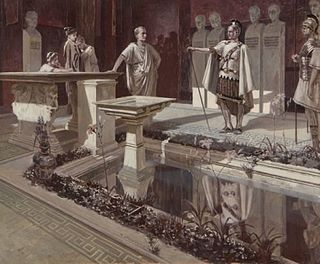Related Research Articles

Aulus Plautius was a Roman politician and general of the mid-1st century. He began the Roman conquest of Britain in 43, and became the first governor of the new province, serving from 43 to 46.

The gens Julia was one of the most ancient patrician families in ancient Rome. Members of the gens attained the highest dignities of the state in the earliest times of the Republic. The first of the family to obtain the consulship was Gaius Julius Iulus in 489 BC. The gens is perhaps best known, however, for Gaius Julius Caesar, the dictator and grand uncle of the emperor Augustus, through whom the name was passed to the so-called Julio-Claudian dynasty of the first century AD. The nomen Julius became very common in imperial times, as the descendants of persons enrolled as citizens under the early emperors began to make their mark in history.
Publius Pomponius Secundus was a distinguished statesman and poet in the reigns of Tiberius, Caligula, and Claudius. He was suffect consul for the nundinium of January to June 44, succeeding the ordinary consul Gaius Sallustius Crispus Passienus and as the colleague of the other ordinary consul, Titus Statilius Taurus. Publius was on intimate terms with the elder Pliny, who wrote a biography of him, now lost.
Gaius Sallustius Passienus Crispus was a prominent figure in the Roman Empire during the first century. He held the consulship twice, and was stepfather of the future emperor Nero.
The gens Scribonia was a plebeian family at ancient Rome. Members of this gens first appear in history at the time of the Second Punic War, but the first of the Scribonii to obtain the consulship was Gaius Scribonius Curio in 76 BC.

Lucius Junius Gallio Annaeanus or Gallio was a Roman senator and brother of the famous writer Seneca. He is best known for dismissing an accusation brought against Paul the Apostle in Corinth.
Titus Flavius T. f. T. n. Sabinus was a Roman politician and soldier. A native of Reate, he was the elder son of Titus Flavius Sabinus and Vespasia Polla, and brother of the Emperor Vespasian.
Scribonia Magna, known in modern historical sources as Scribonia Crassi, was a Roman noblewoman. Scribonia was the daughter of Lucius Scribonius Libo, and Cornelia Pompeia.
Libo Rupilius Frugi was a Roman senator and an ancestor of the emperor Marcus Aurelius. He served as suffect consul in 88.
Gaius Memmius Regulus was a first-century Roman senator. He was ordinary consul in AD 63, with Lucius Verginius Rufus as his colleague.
Sulpicia Praetextata was an ancient Roman noblewoman who lived in the Roman Empire in the 1st century.
LuciusFulcinius Trio was a Roman senator who came from a plebeian family. Trio was an active prosecutor (delator) during the reign of Tiberius who developed a reputation for making accusations. He was governor of Lusitania from about 21 to 31, before returning to Rome to hold the office of consul suffect with Publius Memmius Regulus in 31. His friendship with Sejanus would lead to allegations that ended with his suicide in early 35.
The gens Paccia, occasionally written Pactia, was a minor plebeian family at ancient Rome. Only a few members of this gens achieved distinction in the Roman state, of whom the most illustrious was Gaius Paccius Africanus, consul in AD 67.
Lucius Valerius Catullus Messalinus was a Roman senator during the Flavian dynasty, and is best known as the most hated and ruthless delator or informer of his age. He was feared all the more due to his blindness.
Lucius Annius Vinicianus was a Roman senator during the Principate. He is best known for his involvement in the assassination of Caligula and a rebellion against Claudius.
Gaius Anicius Cerialis was a Roman senator who was active during the Principate. He was suffect consul in the second half of the year 65 as the colleague of Gaius Pomponius Pius.
Marcus Aquilius Regulus was a Roman senator, and notorious delator or informer who was active during the reigns of Nero and Domitian. Regulus is one of the best known examples of this occupation, in the words of Steven Rutledge, due to "the vivid portrait we have of his life and career in Pliny, Tacitus, and Martial." Despite this negative reputation, Regulus was considered one of the three finest orators of Roman times. Rutledge points to the judgment of Martianus Capella, who ranked him with Pliny the Younger and Fronto as the greatest Roman orators after Cicero. However, none of his speeches have survived from ancient times.
Publius Sulpicius Scribonius Proculus was a Roman senator, who was active during the reign of Nero. He was suffect consul in the nundinium of September to October 56 as the colleague of his brother Publius Sulpicius Scribonius Rufus. Both brothers were denounced by the delator Gaius Paccius Africanus to the emperor Nero, who summoned the men to Achaia under false pretenses. Once they arrived, they were charged under the lex maiestas, and forced to commit suicide.
References
- ↑ AE 1993, 460 = Giuseppe Camodeco, Bolletino del Centro internazionale per lo studio dei papyri ercolanesi, 23 (1993), pp. 109-119)
- 1 2 Rutledge, Imperial Inquisitions: Prosecutors and informants from Tiberius to Domitian (London: Routledge, 2001), p. 252
- ↑ CIL X, 8260
- 1 2 Tacitus, Histories , IV.41
- ↑ Dio Cassius, Romaike Historia LXIII.17.3
- ↑ Werner Eck, "Jahres- und Provinzialfasten der senatorischen Statthalter von 69/70 bis 138/139", Chiron , 12 (1982), p. 299